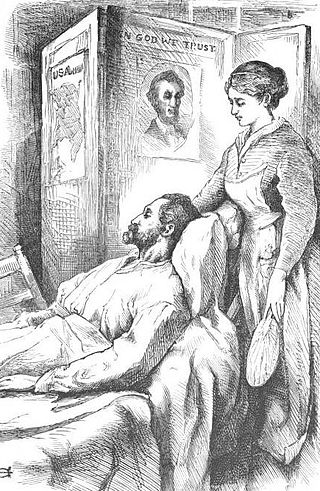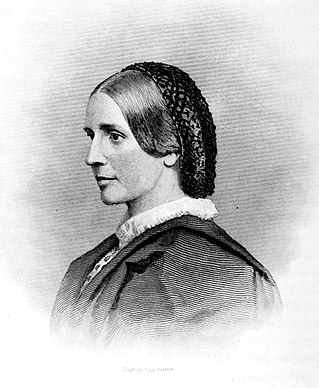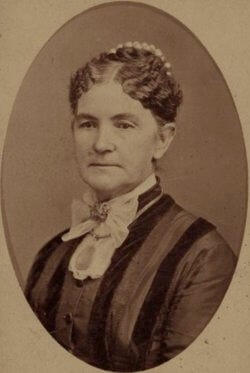Related Research Articles

Dorothea Lynde Dix was an American advocate on behalf of the indigent mentally ill who, through a vigorous and sustained program of lobbying state legislatures and the United States Congress, created the first generation of American mental asylums. During the Civil War, she served as a Superintendent of Army Nurses.

Adelbert Ames was an American sailor, soldier, and politician who served with distinction as a Union Army general during the American Civil War. A Radical Republican, he was military governor, U.S. Senator, and civilian governor in Reconstruction-era Mississippi. In 1898, he served as a United States Army general during the Spanish–American War. He was the last Republican to serve as the state governor of Mississippi until the election of Kirk Fordice, who took office in January 1992, 116 years after Ames vacated the office.

Mary Livermore was an American journalist, abolitionist, and advocate of women's rights. Her printed volumes included: Thirty Years Too Late, first published in 1847 as a prize temperance tale, and republished in 1878; Pen Pictures; or, Sketches from Domestic Life; What Shall We Do with Our Daughters? Superfluous Women, and Other Lectures; and My Story of the War. A Woman's Narrative of Four Years' Personal Experience as Nurse in the Union Army, and in Relief Work at Home, in Hospitals, Camps and at the Front during the War of the Rebellion. She wrote a sketch of the sculptor Anne Whitney for Women of the Day and delivered the historical address for the Centennial Celebration of the First Settlement of the Northwestern States in Marietta, Ohio on July 15, 1788.

Lucy Larcom was an American teacher, poet, and author. She was one of the first teachers at Wheaton Female Seminary in Norton, Massachusetts, teaching there from 1854 to 1862. During that time, she co-founded Rushlight Literary Magazine, a submission-based student literary magazine which is still published. From 1865 to 1873, she was the editor of the Boston-based Our Young Folks, which merged with St. Nicholas Magazine in 1874. In 1889, Larcom published one of the best-known accounts of New England childhood of her time, A New England Girlhood, commonly used as a reference in studying antebellum American childhood; the autobiographical text covers the early years of her life in Beverly Farms and Lowell, Massachusetts.

The Lowell Offering was a monthly periodical collected contributed works of poetry and fiction by the female textile workers of the Lowell, Massachusetts textile mills of the early American industrial revolution. It began in 1840 and lasted until 1845.

The United States Sanitary Commission (USSC) was a private relief agency created by federal legislation on June 18, 1861, to support sick and wounded soldiers of the United States Army during the American Civil War. It operated across the North, raised an estimated $25 million in Civil War era revenue and in-kind contributions to support the cause, and enlisted thousands of volunteers. The president was Henry Whitney Bellows, and Frederick Law Olmsted acted as executive secretary. It was modeled on the British Sanitary Commission, set up during the Crimean War (1853-1856), and from the British parliamentary report published after the Indian Rebellion of 1857.

The Commonwealth of Massachusetts played a significant role in national events prior to and during the American Civil War (1861-1865). Massachusetts dominated the early antislavery movement during the 1830s, motivating activists across the nation. This, in turn, increased sectionalism in the North and South, one of the factors that led to the war. Politicians from Massachusetts, echoing the views of social activists, further increased national tensions. The state was dominated by the Republican Party and was also home to many Radical Republican leaders who promoted harsh treatment of slave owners and, later, the former civilian leaders of the Confederate States of America and the military officers in the Confederate States Army.

The Lowell mill girls were young female workers who came to work in textile mills in Lowell, Massachusetts during the Industrial Revolution in the United States. The workers initially recruited by the corporations were daughters of New England farmers, typically between the ages of 14 and 35. By 1840, at the height of the Textile Revolution, the Lowell textile mills had recruited over 8,000 workers, with women making up nearly three-quarters of the mill workforce.

Lorinda Anna "Annie" Blair Etheridge was a Union nurse and vivandière who served during the American Civil War. She was one of only two women to receive the Kearny Cross. She was inducted into the Michigan Women's Hall of Fame in 2010.

Hospital Sketches (1863) is a compilation of four sketches based on letters Louisa May Alcott sent home during the six weeks she spent as a volunteer nurse for the Union Army during the American Civil War in Georgetown.

Harriet Jane Hanson Robinson worked as a bobbin doffer in a Massachusetts cotton mill and was involved in a turnout, became a poet and author, and played an important role in the women's suffrage movement in the United States.

The Scottish Women's Hospitals for Foreign Services (SWH) was founded in 1914. It was led by Dr. Elsie Inglis and provided nurses, doctors, ambulance drivers, cooks and orderlies. By the end of World War I, 14 medical units had been outfitted and sent to serve in Corsica, France, Malta, Romania, Russia, Salonika and Serbia.
The New England Offering was a collection of journal entries that were written by female mill workers in New England mills. Many of the women who were contributing to the magazine were working in mills in Lowell, Massachusetts. The “Lowell Offering” was a collection of narratives where women shared their works in a intellectual and cultural publication. The contributors took great pride in the magazine. The “Lowell Offering” gained a great deal amount of popularity. It was read by famous writers such as Charles Dickens, Anthony Trollope, and George Sand. The “Lowell Offering” lost momentum after the opinions of the writers moved towards areas that mill owners did not agree with. The “New England Offering” was established after controversy with the Lowell Offering erupted and the editors Harriet Farley and Harriott F. Curtis had to discontinue the “Lowell Offering” and start a new magazine. The magazine's first issue appeared in September 1847, and Farley ended publication with the March 1850 issue.

Emily Elizabeth Parsons was an American Civil War nurse, hospital administrator, and founder of Mount Auburn Hospital in Massachusetts. Her posthumous memoir, Fearless Purpose: Memoir of Emily Elizabeth Parsons, gives a rare glimpse of the American Civil War from a nurse's perspective as she describes her work tending to Union soldiers and managing the nursing staff at Benton Barracks Hospital in St. Louis, Missouri.

Adaline Weston Couzins was a British-born American civil servant, a suffragist, and a Civil War nurse who worked for the Ladies' Union Aid Society of St. Louis. She spent most of her career as a nurse during the Civil War on hospital ships that tended to Union and Confederate soldiers all along the Mississippi River.
Charlotte Elizabeth McKay was an American editor, Union Army nurse, and an anti-suffragist. She worked as a field nurse during the American Civil War, receiving a Kearny Cross from the 17th Maine Volunteer Infantry Regiment, whom she had cared for after the Battle of Chancellorsville. She was the first woman who protested against the suffrage movement, and she was the editor of the first American anti-suffrage periodical, The True Woman.

Margaret Hamilton was a Union nurse during the American Civil War.

Margaret Davidson (1879-1978) a modern languages teacher in Dornoch, Sutherland in the Scottish Highlands, became a leader in the National Union of Women's Suffrage Societies (NUWSS), and one of the volunteer nurses in the Scottish Women's Hospital, in France during World War One, and an early leader of girl guiding in this area of Scotland.
Harriot F. Curtis was an American writer and journalist.

Mary H J Henderson was an administrator with Elsie Inglis's Scottish Women's Hospitals for Foreign Service in the Balkans in World War I, earning five medals. She founded social work and civic groups led by women, in Dundee, Aberdeen and London and served on charitable bodies including Dundee War Relief Fund, and worked for women's suffrage. She was also a war poet.
References
- ↑ Abba Ann Goddard
- ↑ The Lowell offering / written, edited and published by female operatives employed in the mills. v.5 (1845). hdl:2027/hvd.32044019620822.
- 1 2 "Alexander Street Press Authorization". authorize.alexanderstreet.com.
- 1 2 Goddard, Abba A. (13 December 2018). "The Trojan Sketch Book". Young & Hartt – via Google Books.
- ↑ Schultz, Jane E. (10 November 2010). This Birth Place of Souls: The Civil War Nursing Diary of Harriet Eaton. Oxford University Press. ISBN 9780199780730 – via Google Books.
- ↑ "Taking Care of Those in Need (U.S. National Park Service)". www.nps.gov.